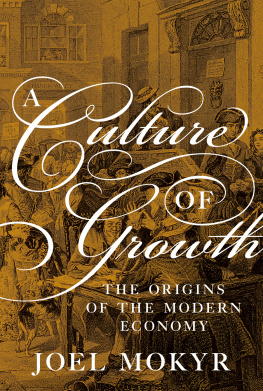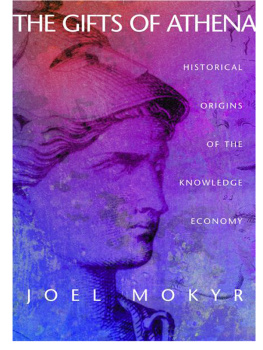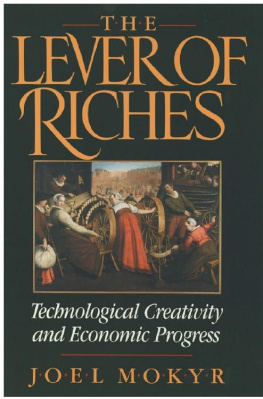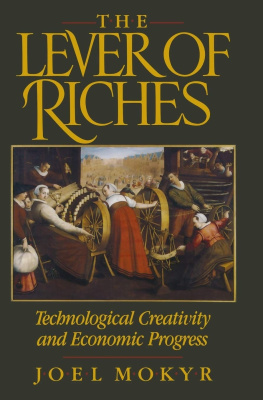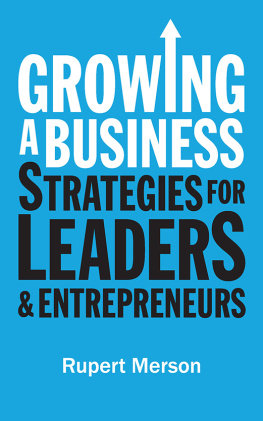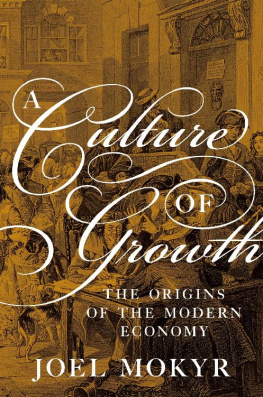Mokyr - A Culture of Growth
Here you can read online Mokyr - A Culture of Growth full text of the book (entire story) in english for free. Download pdf and epub, get meaning, cover and reviews about this ebook. year: 2016, publisher: Princeton University Press, genre: Politics. Description of the work, (preface) as well as reviews are available. Best literature library LitArk.com created for fans of good reading and offers a wide selection of genres:
Romance novel
Science fiction
Adventure
Detective
Science
History
Home and family
Prose
Art
Politics
Computer
Non-fiction
Religion
Business
Children
Humor
Choose a favorite category and find really read worthwhile books. Enjoy immersion in the world of imagination, feel the emotions of the characters or learn something new for yourself, make an fascinating discovery.
A Culture of Growth: summary, description and annotation
We offer to read an annotation, description, summary or preface (depends on what the author of the book "A Culture of Growth" wrote himself). If you haven't found the necessary information about the book — write in the comments, we will try to find it.
Mokyr: author's other books
Who wrote A Culture of Growth? Find out the surname, the name of the author of the book and a list of all author's works by series.
A Culture of Growth — read online for free the complete book (whole text) full work
Below is the text of the book, divided by pages. System saving the place of the last page read, allows you to conveniently read the book "A Culture of Growth" online for free, without having to search again every time where you left off. Put a bookmark, and you can go to the page where you finished reading at any time.
Font size:
Interval:
Bookmark:

A Culture of Growth
A Culture of Growth
The Origins of the Modern Economy
The Graz Schumpeter Lectures
Joel Mokyr
Princeton University Press
Princeton and Oxford
Copyright 2017 by Princeton University Press
Published by Princeton University Press, 41 William Street, Princeton, New Jersey 08540
In the United Kingdom: Princeton University Press, 6 Oxford Street, Woodstock, Oxfordshire
OX20 1TW
press.princeton.edu
Jacket art: Change Alley, London, 1853. Street scene depicting events surrounding the South Sea Bubble (1711-1720). The scene is taking place in front of Garraways Coffee House, with a pawn shop at left. Photo credit: HIP / Art Resource, NY
All Rights Reserved
Library of Congress Cataloging-in-Publication Data
Names: Mokyr, Joel, author.
Title: A culture of growth : the origins of the modern economy / Joel Mokyr.
Description: Princeton, NJ : Princeton University Press, 2016. | Includes bibliographical references and index.
Identifiers: LCCN 2015045838 | ISBN 9780691168883 (hardback)
Subjects: LCSH: Economic development. | Economic history. | BISAC: BUSINESS & ECONOMICS / Economic History. | BUSINESS & ECONOMICS / Development / Economic Development. | BUSINESS & ECONOMICS / Economic Conditions. | BUSINESS & ECONOMICS / Economics / General. | HISTORY / Europe / General.
Classification: LCC HD75 .M65 2016 | DDC 330-dc23 LC record available at http://lccn.loc.gov/2015045838
British Library Cataloging-in-Publication Data is available
The publisher would like to acknowledge the author of this volume for providing the camera-ready copy from which this book was printed
This book has been composed in Callisto MT by the author
Printed on acid-free paper.
Printed in the United States of America
10 9 8 7 6 5 4 3 2 1
Dedicated to
my three siblings
Rob, Miriam, and Ada
who have stood by me
for all those years
It is more easy to account for the rise and progress of commerce in any kingdom, than for that of learning. Avarice, or the desire of gain, is an universal passion, which operates at all times, in all places, and upon all persons: But curiosity, or the love of knowledge, has a very limited influence, and requires youth, leisure, education, genius, and example, to make it govern any person there is no subject, in which we must proceed with more caution, than in tracing the history of the arts and sciences; lest we assign causes which never existed, and reduce what is merely contingent to stable and universal principles. Those who cultivate the sciences in any state, are always few in number: The passion, which governs them, limited: Their taste and judgment delicate and easily perverted: And their application disturbed with the smallest accident. Chance, therefore, or secret and unknown causes, must have a great influence on the rise and progress of all the refined arts.
David Hume, 1742
Contents
Acknowledgments
This book had its origins in the Joseph Schumpeter lectures I delivered in Graz in November 2010 and I am deeply grateful to my hosts at the Schumpeter Society for their hospitality and penetrating comments at an early stage. Books based on endowed lectures tend to be relatively short. This book, however, took on a life of its own, and chapters kept being added. Having argued in previous works that the emergence of a cultural phenomenon we think of as the Enlightenment was central to the economic and technological miracles that mark European history since the Industrial Revolution, it became clear that we should ask hard questions about the origins of the emergence of intellectual innovation and a creative elite of scholars and engineers who pushed the envelope. Modern economics has accepted the challenge to understand matters that half a century lay firmly outside its realm: culture and institutions. In this book, I take a closer look at the culture and institutions of Europe between Columbus and the publication of Principia and ask how and why it created the conditions for modern economic growth.
Books such as this are never written alone. Many colleagues and friends patiently listened to my often incoherent ravings about various issues in intellectual and cultural history that were remote from their own research. Their questions and doubts made my determination to delve deeper stronger, but I surely did not answer all of them. Among my fellow travelers, who have been thinking along similar lines, I should mention three scholars whose work and friendship have been a source of inspiration even if they have different backgrounds: the sociologist Jack Goldstone, the historian Margaret Jacob, and that incomparable economist, historian, and general-purpose intellectual Deirdre McCloskey.
At Northwestern University, I have had for many years the benefit of two groups of colleagues in two large, vibrant, and utterly different departments, Economics and History. Economists, notwithstanding the stereotype, are often extraordinarily insightful and wide-ranging intellectuals. Many of them are also loyal lifelong friends. Among them, of course, the economic historians are foremost: my friends and fellow economic historians Louis Cain, Joseph Ferrie, Mara Squicciarini, and Regina Grafe (now at the European University). Among the other economists, I should mention especially Larry Christiano, Eddie Dekel, Matthias Doepke, Martin Eichenbaum, Robert J. Gordon, Joel Horowitz, Lynne Kiesling, and Charles Manski. In History, the list of colleagues who have enriched and stimulated this book include Kenneth Alder, Lydia Barnett, Peter Carroll, Sarah Maza, Melissa McCauley, Edward Muir, and Yohanan Petrovsky-Shtern. Much like Rabbi Akiva, however, through my entire career I learned the most from my current and former students: Ran Abramitzky, Gergo Baics, Maristella Botticini, Jos Espin, Avner Greif, Ralf Meisenzahl, John Nye, Tuan-Hwee Sng, Yannay Spitzer, Rick Szostak, Chris Vickers, Marlous van Waijenburg, Marianne Hinds Wanamaker, Anthony Wray, Ludovico Zaraga, Nicolas Ziebarth, and Ariell Zimran.
Outside Northwestern, perhaps the best scholarly environment any scholar can imagine is the fabulous Institutions, Organizations, and Growth group run by the Canadian Institute for Advanced Research (CIFAR). This group contains the best minds that social science has to offer in this world, and its interest in economic history is unrivaled. The group has allowed me to interact with and learn from scholars of the calibre of Daron Acemoglu, Roland Benabou, Tim Besley, Rob Boyd, Mauricio Drelichman, Avner Greif, Elhanan Helpman, Joseph Henrich, Roger Myerson, Torsten Persson, James Robinson, Ken Shepsle, and Guido Tabellini, and there exists no research project in social science that will not benefit vastly from the comments and suggestions of this remarkable group of intellects. For four decades now, I have benefited from the inexhaustible wisdom, the learning, and the kindness of my Irish friend and coauthor Cormac Grda. He and our erudite collaborator Morgan Kelly, also at University College Dublin, have many valuable contributions and suggestions to this manuscript. I am also grateful for the encouragement and sage counsel of Professor Alberto Quadrio Curzio, president of the Accademia dei Lincei. In Israel, I have benefited from being a guest in two departments, the Berglas School of Economics at Tel Aviv University and more recently the Interdisciplinary Center in Herzliya under the inspired leadership of Zvi Eckstein. Other Israelis to whom I owe special thanks are my co-authors and dear friends Amira Ofer and Karine van der Beek, my lifelong fellow-traveler, president Jacob Metzer of the Open University, and the ever-thoughtful and wise Manuel Trajtenberg, formerly of Tel Aviv University. Outside those institutions, I owe an enormous intellectual debt to four giants of economic history: Eric L. Jones, the late David S. Landes, the late Douglass C. North, and the late Nathan Rosenberg. More distant in time, but never forgotten, are the memories I have of my late Northwestern colleague Jonathan R. T. Hughes and his wife, Mary Gray.
Next pageFont size:
Interval:
Bookmark:
Similar books «A Culture of Growth»
Look at similar books to A Culture of Growth. We have selected literature similar in name and meaning in the hope of providing readers with more options to find new, interesting, not yet read works.
Discussion, reviews of the book A Culture of Growth and just readers' own opinions. Leave your comments, write what you think about the work, its meaning or the main characters. Specify what exactly you liked and what you didn't like, and why you think so.

